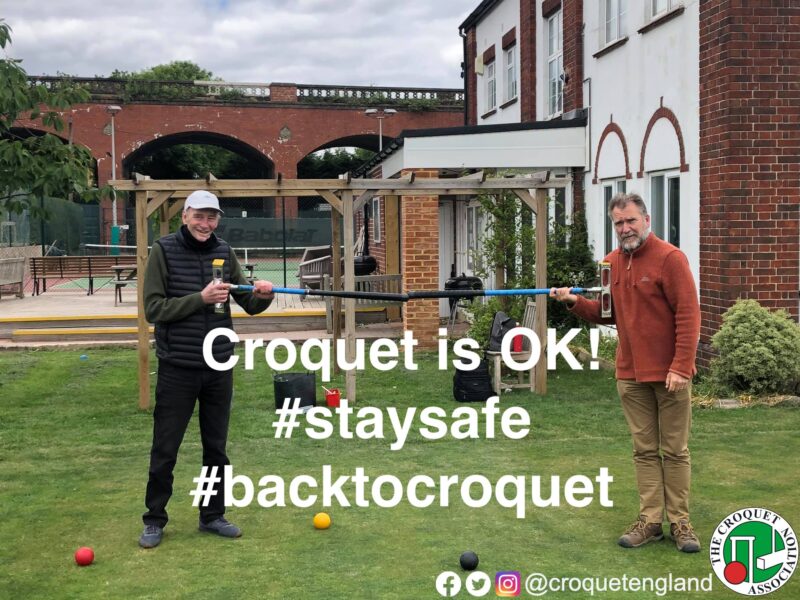Croquet Association Guidance – Covid-19 Precautions for Playing Croquet – Version 2 – 14th May, 2020

The Croquet Association offers the following advice to clubs and players, to minimise the risk of infection by Covid-19 when clubs decide to open for play. Both clubs and players should follow Government guidance, particularly those in vulnerable groups; this advice supplements that general guidance by covering situations specific to croquet. The advice was updated, primarily to insert the following paragraph and encourage provision of signs, on 14th May and may be further updated if government advice changes.
The guidance published by DCMS on 13th May states that organisations are encouraged to think creatively about how best to make their sport or activity possible within the guidelines, but also that they should only reopen or restart activities as soon as they feel able to do so safely. These guidelines should be read in conjunction with that advice.
These are uncertain and very unsettling times. We want our community to stay physically and mentally healthy and as long as it is safe to do, and provided that it is consistent with Government guidance, we want to keep the croquet lawns open and available for members to use. We hope you all stay healthy and that we all get through these challenging times by looking to help each other where we can.
Meanwhile, keep safe, take care, look after yourself and, if possible, enjoy your croquet.
Advice to Clubs
The CA recommends that clubs adopt this advice and adapt it to their circumstances. The advice below recognises that there are now more stringent measures that must be followed if our sport is to be managed in a safe way.
- Clubhouses should only be open to the extent required to access equipment, toilet and hand washing facilities. Bars and catering facilities should remain closed.
- Ensure that the necessary facilities and cleaning products are available to maintain a clean environment and enable players to wash equipment after use.
- Provide hand washing facilities and/or hand sanitiser for players.
- Only pre-arranged games or individual practice should be permitted, not roll-up or public sessions. There should be no more than two players (or four from one household) on a court; this means that double banking is only permitted if all four players are from the same household.
- Provide clear signs to encourage good hand washing technique, social distancing and limits to the number of players per court.
- Consider providing a lawn-booking system, both to avoid congestion and to facilitate contact tracing if necessary.
- No extra-curricular or social activity should take place.
- No guests/ visitors/ spectators should be permitted.
- Where equipment can be left out, then it is preferable to do so. Non-essential equipment should be stored away.
- Avoid the need to share club mallets. Consider allowing members to borrow one for a while.
Advice to Players
- Do not go to the club if you are experiencing any symptoms of a cold or flu, in particular a cough or high temperature. Use the NHS helpline and seek advice. For your own protection, follow the advice about self-isolation if you are, or are living with, someone in one of the vulnerable groups.
- You should only play with people from your own household or by yourself or, as long as you stay 2 metres apart, with one other person from outside your household. Groups of more than two people must all be from the same household. This means you cannot have two or three people from one household plus one person from outside the household playing together. But two people, from two different households, can play together as long as they stay 2 metres apart.
- Any activity should be in line with the Government’s social distancing measures at all times, including when going to and departing from a lawn. Consequently, do not shake hands before or after a game.
- Wash your hands and clean any equipment you use, such as hoops, balls and club mallets, before and after you play.
- When setting out and taking in a court, only one person should handle any particular hoop or the peg.
- Clean padlocks, keys and door handles before and after use.
- Avoid using toilets wherever possible and clean after use.
- Use the court booking system if your club provides one, rather than turning up in the hope of being able to play or practise.
- If possible, dress appropriately prior to travelling to the club, rather than changing there.
- Bring any food or drink you might need.
- Do not use clips, ball markers, corner pegs/offside markers or flags. Players should agree the score at the end of each scoring turn. Personal counters should be used to keep count of bisques/extra turns.
- Do not move stop-boards/check fences, but take relief instead.
- Avoid using movable chairs as far as possible, otherwise clean them before and after use.
- Use your feet, rather than hands, to position balls where you can do so with sufficient precision.
- Players should be their own Referees and acknowledge faults and errors if they occur.